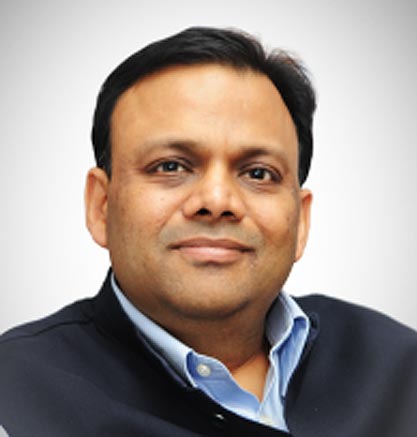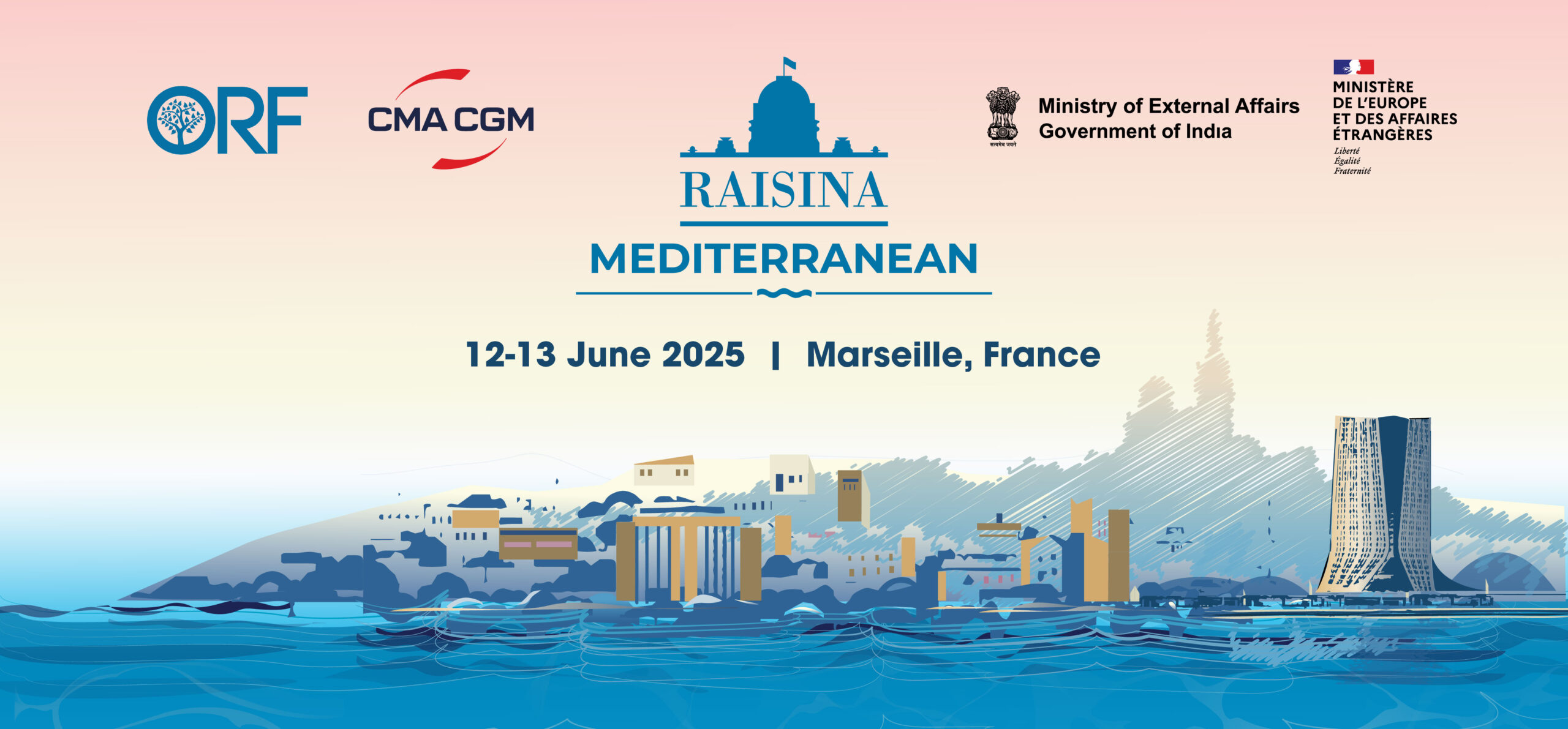12-13
Jun2025
For centuries, the shores of the Mediterranean have hosted cultural exchange, trade, and diplomacy; the sea has served as a vital link between continents and civilisations. By connecting the Indo-Pacific and the Atlantic Oceans, the Mediterranean has has acted as a critical link between East and West, North and South — and determined thereby the flow of goods, ideas, and culture. Today, as the global economic order undergoes profound transformation, the region is once again emerging as a strategic maritime hub.
This comes at a time of strategic convergence between Europe and the Indo-Pacific, highlighted by Prime Minister Modi’s successful visit to Paris and the recent visit to India by the President of the European Commission and the entire EU College of Commissioners. From de-risking supply chains, to investing in critical defence technologies, to negotiating a new trade pact – the EU-India relationship has the potential to emerge as a system-defining defining partnership.
As envisioned by the President of the French Republic and the Prime Minister of India, Raisina Mediterranean will convene the conversations that matter to this region, and describe how its links to India and the Indo-Pacific will shape our common future. From modern shipping corridors and undersea cables to renewable energy projects and regional security cooperation, the Mediterranean is no longer just a bridge between the past and present—it is a launchpad for the future.
ORF, in collaboration with France’s Ministry of Foreign Affairs and key regional partners, seeks to chart a new course for Mediterranean cooperation. By addressing shared challenges and capitalising on emerging opportunities, Raisina Mediterranean aims to lay the foundation for a resilient, interconnected Mediterranean community capable of driving global conversations on governance, sustainability, and shared prosperity.
Pillar I
The Mediterranean as Crossroads: Partnerships, Prospects and Prosperity
At a turbulent moment for global trade and for historic partnerships, the choices made by the powers of the Mediterranean will determine our shared prosperity. As the Indo-Pacific’s influence in the global economy expands and new growth centres emerge across the African continent, the Mediterranean’s role as a bridge between the Global South and North has gained even more importance. This thematic pillar explores the partnerships that will define the Mediterranean in the 21st century— whether in trade and infrastructure, in maritime cooperation, or in energy. It will examine, in particular, the convergence in interests between India and France, between the Indo-Pacific and the European Union, and how ambitious plans for connectivity, trade and investment can elevate these partnerships.
Pillar II
Troubled Waters: Europe, the Indo-Pacific, and Collective Security
The post-War order, which stabilised trade and galvanised investment, can no longer be taken for granted. Great power competition has forced difficult choices on nations, and those who underwrote collective security have registered their unwillingness to bear that burden indefinitely. Europe faces war in its east, conflict in West Asia, and turbulence in the Sahel. This thematic pillar examines how Europe will emerge as a strategic actor in the coming decade, and the implications of such an emergence for its partners, especially in the Indo-Pacific. It will also consider the evolving security postures of the powers of the region, especially France — which is both a European and and Indo-Pacific power — and how partnerships are needed for competitiveness in defence technology and to protect against geo-economic coercion.
Pillar III
Blue Transactions: Resilience and Growth
The shared waters of the Mediterranean can become the location of a shared agenda for prosperity, sustainability, and resilience. Energy initiatives such as offshore wind farms and solar corridors highlight the region’s leadership on climate action; its crowded sea lanes reveal the continuing importance of trade; its coastal communities demonstrate the value of investing in the blue economy. The nations of the region can demonstrate how clean energy can be scaled up, the digital economy can transform lives, and how maritime operations and logistics can be modernised — all while retaining momentum on climate action and biodiversity protection. The region’s rich natural resources and biodiversity demand effective governance of the global commons through collaborative action. The resilience of the Mediterranean is also intertwined with growth and prosperity in West Asia and Sub-Saharan Africa, and so financing mechanisms and frameworks for the Sustainable Developmental Goals (SDGs) must be prioritised. This thematic pillar discusses the Mediterranean’s central role in shaping the global blue economy, and the potential pathways to unlock further growth and resilience in the region.
Pillar IV
Gateway to the Globe: Connectivity, Trade, and Infrastructure
Growth in both the Indo-Pacific and in Europe depends upon secure, efficient and resilient connectivity between these two hubs of the global economy. The multiple supply chain and geopolitical shocks over the past few years highlight the importance of investing in de-risking supply chains, building alternative routes and maritime infrastructure, and facilitating digitalisation of shipping procedures. The sea lanes between these regions need to be upgraded and protected, and new infrastructure corridors that can enhance trade and collaboration must be unlocked. Meanwhile, sustainable fuels like hydrogen and ammonia have the potential to revolutionise the industry. This transformation would need investments in port modernisation, green shipping, and sustainable maritime practices, while also addressing disputes and ensuring the security of its sea routes. This thematic pillar will examine now innovations in the Mediterranean and its associated trade corridors. will propel modernisation to shipping and ports globally, and provide a template for 21st century maritime infrastructure.
Pillar V
Data Across the Seas: The 21st Century Tech Bridge
New technologies are shaking up the world order, fundamentally altering the structure of the global economy, and creating new drivers of growth. Startup hubs across both the Global North and South are at the forefront of this technological innovation—emerging as pivotal nodes in the global economy and reshaping the urban landscapes they inhabit. From Mumbai and Bengaluru to Paris and Marseille, vibrant startup ecosystems are emerging as key incubators of new technologies and business models. These innovation hubs must be connected, so ideas, technology, and capital can flow from one to another and allow them to rapidly build scale. Such collaboration holds the promise of unlocking untapped potential across diverse sectors—including AI, maritime and shipping innovation, clean energy, smart logistics, and the modernization of ports. However, as the world navigates multiple technology transitions, it is also essential to ensure that the Global South is not left on the sidelines and is an active stakeholder. This thematic pillar explores the growing salience of startup across the Global North and the South and the potential pathways to bridge them to unlock further technological and economic growth.
Featured Speakers

Jean-Noël Barrot
Minister for Europe and Foreign Affairs, France

Ararat Mirzoyan
Minister of Foreign Affairs, Armenia

S Jaishankar
Minister of External Affairs, India

Michael Falzon
Minister for Social Policy and Children’s Rights, Malta

Giorgos Papanastasiou
Minister of Energy, Commerce and Industry, Cyprus

Athanasios Ntokos
National Security Advisor, Greece

Edoardo Rixi
Deputy Minister of Infrastructure and Transport, Italy

Stefanos Gkikas
Deputy Minister for Shipping and Insular Policy, Greece

Davit Karapetyan
Secretary-General, Ministry of Foreign Affairs, Armenia
Speakers

Abigaël Vasselier
Director, Policy & European Affairs; Head of Program, Foreign Relations, Mercator Institute for China Studies, Germany

Abla Abdel Latif
Executive Director and Director of Research, The Egyptian Center for Economic Studies, Egypt
.jpg)
Alexis Morel
Vice President, Optronics & Missile Electronics, Thales, France

Angus Blair
Partner, Outset Ventures, New Zealand

Anne-Marie Brady
Professor, University of Canterbury, New Zealand

Anurag Thakur
Member of Parliament, Lok Sabha, India

Arvind Gupta
Head and Co-Founder of Digital India Foundation, India
.jpg)
Asma Mhalla
Political Scientist, France

Camille Lons
Deputy Head of the Paris office, European Council on Foreign Relations, France
.jpg)
Christopher Schroeder
Co-founder, Next Billion Ventures, United States of America

David Woods
Deputy Chair, New Zealand Green Investment Finance, New Zealand

Del Titus Bawuah
Founder and Chief Executive Officer, Web3 Africa Group, Ghana

Digvijay Singh
Head of Products, Drizzle Health, United States of America
.jpg)
Dinesh Trivedi
Former Minister for Railways, India
.jpg)
Fernando Gutiérrez
Member of Parliament, Spain
.jpg)
Francesco M. Talò
Special Envoy for IMEC, Italy

Francesco Parisi
President & Managing Director, Parisi Group of Companies, Italy
.jpg)
Frederic Varaine
Founder, Otrera Nuclear Energy, France
%20(1).jpg)
Geraldine Ang
Team Lead, Clean Energy Finance & Investment Mobilisation, OECD
.jpg)
Gérard Mestrallet
Special Envoy of the French President for IMEC, France

Gladden Pappin
President of the Hungarian Institute of International Affairs, Hungary

Harsh V Pant
Vice-President, Observer Research Foundation, India
.jpg)
Herbert Krapa
Former Minister of Energy, Ghana

Hossein Masjedi
Co-Founder & Chief Data Officer, Smart Runners, India

Isabelle Saint-Mezard
Associate Research Fellow, Center for Asian Studies, IFRI, France
.jpg)
Jawed Ashraf
Former Ambassador of India to France and Monaco, India

Jayadev Galla
Former Member of Parliament; Chairman & Managing Director, Amara Raja Energy and Mobility Ltd, India

Ji Yeon-Jung
Assistant Professor, Department of Military History and Strategy, Republic of Korea Naval Academy, Republic of Korea

Josianne Cutajar
Former Member of the European Parliament, Malta

Karim El Aynoui
Executive President, Policy Center for the New South, Morocco

Kira Vinke
Head, Center for Climate and Foreign Policy, German Council on Foreign Relations, Germany

Kristina Kausc
Deputy Managing Director and Senior Fellow, German Marshall Fund South, Spain

Ludovic Renou
Executive Vice President, Global Expérience Network, CMA CGM Group, France

Maggie Sprenger
General Partner, Audere Capital, United States of America

Mallory Knodel
Executive Director, Social Web Foundation, United States of America

Manish Tewari
Member of Parliament, Lok Sabha, India
.jpg)
Marcos Perestrello
Member of Parliament, Portugal
.jpg)
Mathias Fonlupt
President & Founder, ENTENT, France
.jpg)
Megan Reiss
Founder and Chief Executive Officer,SolidIntel Inc, United States of America

Mehdi Jomaa
Former Prime Minister, Tunisia
.jpg)
Michel Narchi
Vice President and Head of International Operations, Airbus, France

Mohamed Al Sharhan
Managing Director, World Governments Summit, United Arab Emirates

Mohamed Nasheed
Secretary-General, Climate Vulnerable 20 & Former President of Maldives

Namrata Upreti
Co-Founder, EarthSaathi, India

Naor Gilon
Former Ambassador to India, Israel
%20(1).jpg)
Natalia Pouzyreff
Member of Parliament, France
%20(1).jpg)
Oana Popescu Zamfir
Director, GlobalFocus Center, Romania

Paula Cipierre
Director, Data Ethics & Innovation, ada, Germany
.jpg)
Priyanka Chaturvedi
Member of Parliament, India

Priyanka Sainani
Founder, Hygge, United Arab Emirates
.jpg)
Rami Mortada
Ambassador of Lebanon to the United Kingdom, Lebanon
.jpg)
Randa Slim
Non-Resident Fellow, Foreign Policy Institute, The Johns Hopkins University School of Advanced and International Studies, United States of America
.jpg)
Rodolphe Saadé
Chairman and Chief Executive Officer, CMA CGM, France

Romana Vlahutin
Visiting Distinguished Fellow, German Marshall Fund, Romania

Ryan Shearman
Chief Executive Officer, Loa Carbon, United States of America
.jpg)
Rym Momtaz
Geopolitical Consultant and Editor-in-Chief – Carnegie, France

Samir Saran
President, Observer Research Foundation, India

Samuel Bashfield
Defence Researcher, Australia India Institute, University of Melbourne

Sanjeev Sanyal
Member, Economic Advisory Council of the Prime Minister, Government of India
.jpg)
Sanjeev Singla
Ambassador of India to France, India

Sean Sheppard
Chief Executive Officer, Radical Catalyst, United States of America

Sharon Stirling
Director, ORF Global; Chief Operating Officer, ORF America, United States of America

Shaurya Mohan
Co-Founder, EarthSaathi, India
.jpg)
Tanya Saadé Zeenny
Executive Officer, CMA CGM Group; President, CMA CGM Foundation; Member, CMA CGM Board of Directors, France

Tara Varma
Visiting Fellow, Brookings Institution, United States of America

Tristan Aureau
Head of the Centre for Analysis, Planning & Strategy, Ministry of Foreign Affairs, France

Utkarsh Singh
Chief Executive Officer, DronaMaps Private Limited, India

Valbona Zeneli
Non-resident Senior Fellow, Scowcroft Center for Strategy and Security, Atlantic Council, United States of America

Valeria Talbot
Head, Middle East and North Africa Centre, incharge of Middle East Studies, Institute for International Political Studies, Italy
Hosts




Partners









